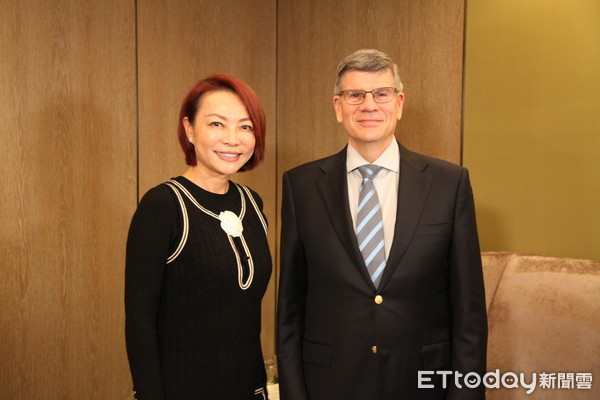
▲ 黃寶慧獨家專訪哈佛漢學專家柯偉林(William Kirby)。(圖/ETtoday)
國際中心/綜合報導
美國總統川普與中國國家主席習近平11月會晤後,達成貿易戰「90天休戰期」的共識。當今中美關係正在重塑世界新秩序,這兩大經濟體是否會陷入新冷戰局面?而台灣又會受到什麼影響?《ETtoday新聞雲》執行董事、主持人黃寶慧獨家專訪哈佛大學費正清中國研究中心前所長、哈佛中國基金主席柯偉林(William Kirby),暢談中美關係、兩岸關係,以及夾在兩強之間的台灣政府的因應策略。
與總統蔡英文、前總統馬英九都熟識的柯偉林在訪談中提到,2018年的台北是個繁榮、和平的時代,台灣在兩岸關係達到某個程度的正常化,卻沒有統一,是一項「了不起的成就」,所以不應該輕易受到危害,未來「中華民國必須處理自己的利益、自己的安全,應該跟美中兩國都保持友好穩健的各種關係,能夠讓安全維持下去。」
訪談全文如下:
中美之間的衝突,對台灣向來都是壞消息?
黃寶慧:教授,我們知道美國總統川普和中國領導人剛達成協議,在G20峰會,雙方有90天的緩衝期來降低緊張。為什麼呢?90天後,貿易戰是否會重啟?目前為止,哪個國家佔上風呢?因為我記得在您某一次訪問中,曾說過中美之間的衝突,對台灣向來都是壞消息。
柯偉林:我想確實如此。在這個狀況下,台灣有點像是貿易戰中的附帶損害。我想目前沒有任何一方佔上風。倘若還要繼續維持好一段時間的話,可說是經濟上的相互保證毀滅。我不認為會這樣,因為中美關係對雙方來說都太重要了。而且雙方有太多行為者,有太多所謂的利益團體,或太多人跟對方的經濟相連,對兩個經濟體都是如此,都認為貿易戰不該持續太久。
即便如此,不論是暫停或是停戰,就美國的觀點來看,都是讓中方提出反制措施的機會。這很困難…很容易可以想像…雙方都可以在90天或180天內宣布勝利。在這種貿易糾紛中,有很多保留面子的方法。美日以往的關係有許多例子。其實台美1980年代的經濟問題,也是圍繞著嚴重的貿易爭端。
而在90天內不會發生的事,是中方,即便想要,也不會改變自己基本的方向,與基本政治經濟體制的特色,但這些其實在許多方面,就是此次爭端的中心。
▼ 柯偉林指出,台灣有點像是貿易戰中的附帶損害,而中美貿易戰目前沒有任何一方佔上風。(圖/ETtoday)
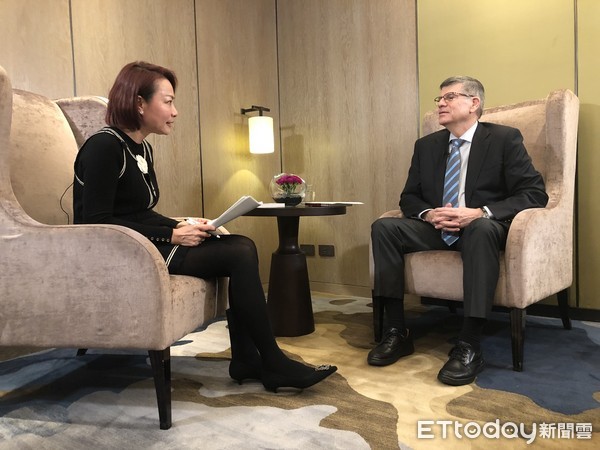
黃寶慧:我注意到您對於川普政府有做出一些評論。您曾經在台灣媒體的訪問中提到,中美貿易戰是由川普政府所引起,這個政府既不專業,也忽視了中美貿易關係與國際現實。因此現在…
柯偉林:我想我相當正確。
黃寶慧:是的,相當正確。但我們看到川普總統已經採取強勢的立場處理對中國的貿易、南海、與其他議題。在可預見的未來,美中關係的緊張局勢是否會持續下去?
柯偉林:我想可能會在幾個方面持續下去。但首先,在剛上任的一年半內,川普政府在這個政策領域,就如同在其他領域,展現驚人的無能、組織不良、與缺乏準備的總和,例如你問中國的資深對話者/官員(interlocutors),跟川普政府打交道時,應該找誰? 他們能提出最好的答案,就是庫許納(Kushner)家族。這其實不夠好,坦白說,而且川普政府花了很長的時間,才把資深人員部署到國務院、國防部、國安會,他們才對中國有認真的瞭解。
即便如此,現在川普政府已經上任將近兩年,才開始有一致性的中國政策。在許多領域,都是強硬的政策,在政治事務、意識形態,甚至可以說在安全事務,和經濟事務都是。為什麼會這樣?很難說,但川普現在身邊的顧問,現在比起以前,有了較多的一致性。
潘斯副總統也許最近說得最為清楚。但如果你去看看重要的因果關係,在過去五年習近平領導下的中國,已經大大的左傾。對許多觀察家來說,毫不意外,大力左傾會增加黨的控制,增加國營企業,減少進入,或明顯減少國際企業進入中國市場,希望能在國內和國外創造中國的贏家和國家的支持者。
在此同時,川普領導的美國也已經…以非常沒有組織的方式向右傾。雙方在許多議題更加的悖離。我想這種長期趨勢會繼續下去,不論是在處理南海議題、不論是處理中國在東亞的外交關係、不論是處理中國國內的經濟政策或國際經濟政策。
▼ 川普政府已經上任將近兩年,才開始有一致性的中國政策。(圖/ETtoday)
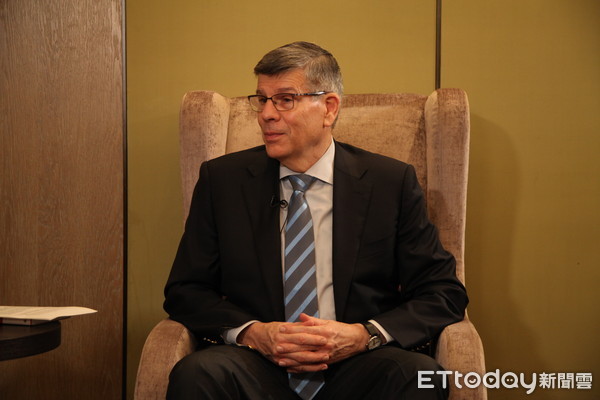
美中是否會陷入新冷戰局面?
黃寶慧:您剛才提到潘斯副總統。他似乎對中國採取非常鷹派的立場。潘斯副總統在10月的演講,給中國直率的警告,不少人解讀為美國發動新冷戰,到底美中未來是否真的會形成冷戰?美中的冷戰與美蘇的冷戰在本質上是一樣的嗎?
柯偉林:首先,我不認為會有另一次冷戰。美國和中國比起過去美蘇,有更多共同的利益。美國和蘇聯在冷戰時期,陷入全球爭霸的鬥爭中。現在的世界,已經不再是代理人戰爭,有上千枚飛彈針鋒相對,或是柏林的劍拔弩張…從1948年的封鎖,持續到1989年柏林圍牆倒塌。現在已經大不相同。過去中美沒有廣泛的貿易文化關係,不像現在中美有許許多多的共同點。但如果你看潘斯的演講,這是一篇絕佳的演講。我建議您的觀眾應該要閱讀他演講的全文,加上,在中美關係歷史中,這篇演講充滿迷思,這是美國人想看到的中美關係,或是某些美國人想看到的中美關係。
例如美國和中國,根據這篇演講,向來維持很好的關係,直到1949年。美國是中國友好的力量。美國在19世紀和中國進行貿易,買賣皮草和香料。但不知道是什麼原因,潘斯先生忘了鴉片,但其實鴉片對於波士頓地區,是重要的貿易來源。我想潘斯的演講,是美國針對中國從1950或60年代以來,最為強硬的說詞,它讀起來,好像也是寫於50或60年代,如果你把中國替換成蘇聯的話。這篇演講只有在局勢失控的情況下,才會更顯重要。現在我認為這是美國右傾勢力面對中國時的強硬觀點的聲明。
2018年的台北。這是個繁榮的時代,這是個和平的時代。
黃寶慧:最近有個詞叫「修昔底德陷阱」,這是由一位哈佛教授提出的理論。
柯偉林:格雷厄姆.艾利森(Graham Allison)教授,來自甘迺迪學院,您從那裡畢業。
黃寶慧:是的,沒錯。這個詞的意思是一個新興大國挑戰現有的強權時,兩國終須一戰。請問您的看法是?
柯偉林:我是艾利森教授的好朋友,也相當景仰他。但我身為歷史學家,在此恕難同意他的看法。確實,新型國家總是會與現有大國產生衝突。有時候會發生,但有時候也不會發生。英國知名的歷史學家 A.J.P.泰勒(A.J.P. Taylor)曾說過一句名言:「戰爭從來都不是無可避免,直到爆發時,政治人物有責任要盡全力避免戰爭爆發。」看看我們的世界,我們在2018年的台北。這是個繁榮的時代,這是個和平的時代。
從1979年中越戰爭到現在,目前可說是東亞從鴉片戰爭以後,有史以來最長久的承平時期。沒有和平,就沒有繁榮。我無法想像,任何情境我都無法想像,不論是對中國或美國,我們的國家利益能透過發動戰爭來鞏固。中國沒有敵人,中國的邊境沒有受到任何國家威脅。不是俄國、不是日本、也不是台灣,除非國民黨想要反攻大陸。不是越南、不是印度。中國邊境唯一的威脅來自北韓,因為你永遠不知道他們什麼時候會發射飛彈過來。中國擁有在近代史上最佳的策略位置,也必須瞭解這是多麼珍貴的時代。
美國,很不幸的,近年來都沒有發生戰爭。美國不想捲入戰爭,但卻付出了極為高昂的代價,如果你看阿富汗跟伊拉克。美國的戰略利益裡,完全不必要跟中國發生軍事衝突。因此,我不認為戰爭是無可避免的,我也不相信有可能會發生戰爭。
黃寶慧:那我覺得安心許多。
柯偉林:好,謝謝。
▼ 柯偉林表示,「我不認為最近選舉結果,國民黨的成功,就代表這是對兩岸關係公投的唯一指標。」 (圖/ETtoday)
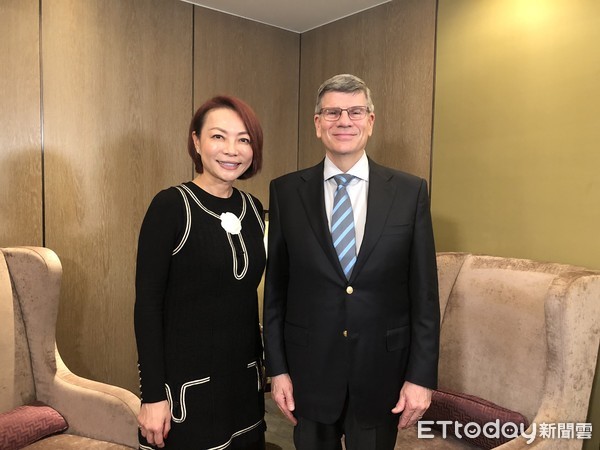
九合一選舉落幕,美國國務院稱讚台灣的憲政民主是「印太地區的典範」,美方的立場為何?
黃寶慧:我們知道您不僅是中美專家,也是台灣專家,我們知道您非常喜歡台灣。
柯偉林:我第一趟亞洲行就是很多很多年前到台灣。
黃寶慧:您在哪裡學中文?
柯偉林:我在台灣師範大學國語中心學中文,在中央研究院近代歷史研究所做研究,所以台灣其實是我為什麼成為教授的原因之一,因為我在這裡,在台灣進行中國研究有很好的開始。
黃寶慧:太棒了!所以您仔細觀察台灣發生的狀況。就在台灣地方選舉結果在11月底公佈後,就在兩週前,美國國務院立刻在推特發出聲明,「祝賀台灣再次成功舉行自由與公正的選舉,台灣的憲政民主是印太地區的典範。」請問您如何解讀這個訊息?為何是印太地區?美方的立場為何?
柯偉林:這個問題很好。您可以說這個聲明是美國建議台灣可以成為中國大陸的模範。並不是…其實有更多涵意。「印太」一詞沒有具體定義,可以有各種解釋,從巴基斯坦到阿留申群島都算。但台灣作為了不起的民主典範…我認為這項聲明是正確的。
意思是台灣選票計算的速度比美國各州更快且公平。我希望台灣不只是印太的典範,或許也可以成為北美的典範,至少當美國的典範,我們在美國要計算所有的選票還是有很大的困難。
蔡總統最好別再接川普的電話了?
黃寶慧:教授,我們剛才提到了中美間的衝突對台灣向來都是壞消息。
柯偉林:是的。
黃寶慧:夾在中美兩強之間,兩強的任何一個舉動,都會影響到台灣,處在這當中,台灣政府應該如何因應?
柯偉林:我認為台灣必須處理…中華民國必須處理自己的利益、自己的安全,應該跟美中兩國都保持友好穩健的各種關係,能夠讓安全維持下去。安全與繁榮…在過去幾年,台灣受益於經濟…我應該說受益於和中國的文化連結,當然還有與美國的連結。台灣在兩岸關係達到某個程度的正常化,卻沒有統一。這項了不起的成就,就我看來,不應該輕易受到危害。
我認為台灣應該…你知道…或許蔡總統最好不要再接川普打來的電話了,但台灣再次展現了穩健的民主,這是此次選舉的成就,是幾年前上次選舉的成就,也是我所見證過台灣每次總統選舉的成就。這是中華民國的公民應該深以為榮的成就。
來自各黨的候選人都是支持台灣,這點至關重要。
黃寶慧:提到最好不要再接川普總統的電話。據說現任蔡英文總統受到美國政府支持,而下任總統大選呼聲很高的另一位候選人,您的好友,前總統馬英九,則受到中國青睞。您怎麼看待台灣2020年的總統大選?
柯偉林:我的猜測是競爭會很激烈,或許沒有像到時同時舉行的美國大選那麼激烈,但我不同意蔡總統、或是馬總統,是受到美方的青睞或是不青睞這樣的說法。就以這個例子來說,美國支持任何當選且代表台灣人民的總統。
黃寶慧:但中國確實比較喜歡馬總統。
柯偉林:或許在馬總統任內,與中國大陸維持較為長期的友好關係,但我不認為最近選舉結果,國民黨的成功,就代表這是對兩岸關係公投的唯一指標。確實,國民黨的候選人未必是支持中國,我想這裡大部分的候選人,就我瞭解,所有來自各黨的候選人,都是支持台灣,這點至關重要。他們的差別,當然就是在如何處理兩岸關係,這樣的關係應該有什麼原則。但如果舉例來看,這裡我覺得中國要負大部分責任,但並非所有的責任,就是所謂的「九二共識」。
我一年前上了大陸的電視,主持人,就像您一樣,跟我說蔡總統為什麼…不對,他沒這麼說。他說為什麼蔡英文是這樣的分離主義者?她為什麼不同意九二共識?
我就說,我最近幾年沒有,但之前有跟蔡總統見面,在她擔任其他職務的時候。她非常聰明,也很謙虛,也是個體貼的人。主持人就打斷我說,我們在大陸,不會叫她蔡總統。我就提醒他,蔡是「民選」總統,不是像很多其他地方的「指派」總統。
黃寶慧:您直接跟中國人意見相左?
柯偉林:是的,最後,他們還是在電視上播出,謝謝他們寬宏大量。九二共識,我們必須記得,我曾經見過辜振甫先生,也跟他討論過這個問題。這是「同意不同意/求同存異(agreement to disagree)」。如果認真看待,這是一個理想,我們應該都屬於大中華,所謂的大中華人民,但具體來說,完全跟統一無關,也當然跟政治統一無關。它大體上是個虛構的概念,我們必須瞭解。在許多方面,中美之間1970年代的「一中政策」,也是針對什麼叫做「一中」,採取「同意不同意/求同存異(agreement to disagree)」,這個作法也很有效。
外交虛構(Diplomatic fictions)可以有非常大的效果,我當時說過,現在再說一次。如果九二共識順其自然發展,倘若不再有用的話,如果要提出其他共識,也沒那麼難,或是提出其他說詞,讓中國和台灣能夠在這個廣大迷人的地方共存,在這個至少地區之外的人稱之為「大中華」的地方共存。
黃寶慧:太好了!謝謝教授。
柯偉林:我的榮幸。
柯偉林為哈佛大學費正清中國研究中心前所長、哈佛中國基金主席,專攻1949年後中華人民共和國外交關係、中國商會史以及20世紀全球史,曾擔任前總統馬英九的中國問題老師。著作包括《強國不強?中國國力與經濟成長的極限》、《中國與世界的互動: 國際化,內化與外化》以及《德國與中華民國》。
費正清中國研究中心(Fairbank Center for Chinese Studies)建立於1955年,是哈佛大學從社會科學角度研究現當代中國的研究中心,第一任所長為美國漢學家、歷史學家費正清(John K. Fairbank)。
英文訪談全文:
Rebecca: Professor, we know that US President Trump and a Chinese leader just agreed to a temporary 90-day ceasefire at the G20 to defuse the tension, and why would they do that? and after 90 days, will the trade war will be restarted? And as of now, which country has the upper hand? Because you know I recalled in one of your interviews, you said that confrontation between the US and China is always bad news to Taiwan.
Kirby: I think that is absolutely true, and in this case Taiwan is a good bit of collateral damage in this in this trade dispute. You know I think neither side has the upper hand at this moment. It's a case of you know if it were to go on for a significant period of time, it's the economic version of mutually assured destruction. I don't think it will,
because the relationship is simply too important to both China and to the United States. And there are too many actors on both sides, too many can call them interest groups, or too many people who are connected to the other economy, in both economies, to allow this to go on for long. That said, the pause as it were or the ceasefire in it, was from the American point of view an opportunity to allow the Chinese side to come up with some counter proposals. It's difficult…it's easy to imagine that one can… both sides will be able to declare victory in 90 days or 180 days. There are many face-saving ways out of these kind of trade disputes. The history of US-Japan relations shows many… The history actually in the 1980s of US-Taiwan economic tensions shows many ways around serious trade disputes.
What's not going to happen in 90 days is that the Chinese side, even if it wished to, is not going to be able to change its fundamental direction and the fundamental elements of its political and economic system which are actually in many ways at the heart of this dispute.
R: I noticed you had made some comments on Trump's administration. You once mentioned that in your interview with a Taiwan media before. You mentioned that the trade war between the US and China is caused by the Trump administration, which is not only unprofessional but also ignores the US-China trade ties and the
international realities. So now…
K: I think I was quite correct.
R: Quite correct, yes. But we see now that the President Trump has taken a tough stance on China regarding trade, the South China Sea, and other matters. In the foreseeable future, will tensions continue to last in the US-China relations?
K: I think they are likely to last in a multiple set of ways, but first, let me say that the first year and a half of the Trump administration in this policy area, as in virtually every other one, was marked by a remarkable combination of incompetence, disorganization, lack of preparation, in which you know if you would ask senior Chinese interlocutors whom to deal with in the Trump administration, the best that they could come up with was the Kushners. That's actually not quite good enough, quite frankly, and it's taken a very long time for the Trump administration to have senior people put in place in State Department, and Defense Department, National Security Council, who know anything serious about China. That said, now nearly two years into this administration, there is a beginning of a coherent policy toward China. It's very much of a hardline policy on multiple fronts on political matters, on ideological matters one might say, and on security matters, and on economic matters. And why this has happened? It's difficult to say, but you have the advisors around Trump right now, who are more of one voice than they have been in
the past.
Mr. Pence probably is articulated this most recently and most clearly. But if you were to look at kind of large causal reasons, in the last five years under Xi Jinping, China has gone to the left very significantly. And for many observers, unexpectedly strongly to the left in favor of increased party control, increased state-owned enterprise, reduced access or apparently reduced access for international firms to Chinese market areas, seeking to create Chinese winners and national champions at home and abroad. Meanwhile, the United States under Trump has emerged in a fittingly…it has merged in a very disorganized way to the right. And so you have both sides having moved further apart on many issues. And I think that long-term trend is likely to continue, whether it's dealing with South China Sea, whether it is dealing with China's foreign relations here in East Asia, whether it is dealing with Chinese domestic economic policy or international economic policy.
R: You just mentioned Vice President Mike Pence. It seems like he takes a very hawkish stance on China. So Vice President Mike Pence gave a speech in October to give China a blunt warning. Many people see this as a way for the US to restart the Cold War. Will there be another Cold War? and what is difference between the Cold War between the US and USSR and the one between the US and China?
K: Well first of all, I don't think actually there will be another Cold War. You know the United States and China have so many more interests in common than the United States and the Soviet Union did. The United States and the Soviet Union during THE Cold War were locked in a global struggle for dominance, as it were. We’re not in a series of proxy wars around the world, had thousands of missiles pointed at each other, where swords pointed Berlin from 19th… from the beginning of the blockade …in 1948 through the duration of the Cold War till 1989 when the wall came down. It's a quite a different experience. They certainly had no expansive trade and cultural relations of the way that China and the United States, or China the United States have many many more things in common. But if you look at Pence’s speech, it's a fascinating speech. I would recommend that your viewers read the whole speech, and plus, it's an effort as a history, at a history of Chinese American relations, it's highly mythological. It’s the Chinese-American relations as the Americans would like to see them, or some Americans would like to see them.
For example, the Untied States and China, according to the speech, have always had wonderful relations until 1949. The United States was a beneficent power in China. It traded, say in the 19th century with China, with furs and spices. Somehow or other, Mr. Pence forgets opium, which was actually a very important source of trade for the Boston area. So it is...so I think I think that Pence’s speech is the most hardline articulation of a policy toward China since the 1950s or 1960s, and indeed it reads as if it was written in the in the 1950s or the 1960s, substituting China for the Soviet Union and for many parts of it. It will be an important speech only if things get out of hand. Right now I would take it as a statement of the hardest point of view from the American right vis-à-vis China.
R: Recently, there is a term called “Thucydides's Trap”. It’s also a theory developed by a professor at Harvard.
K: Professor Graham Allison from Kennedy School, where you graduated.
R: Yes, yes, yes. That means when one rising power challenges the existing superpower, then war is almost always inevitable. So what’s your view on that?
K: Well I'm a great friend and an admirer of Professor Graham Allison. I would respectfully disagree with him that as a historian, that it is true that a rising power always comes into conflict with an existing power. Sometimes it happens, very often it does not happen. There's a famous saying by the great British historian AJP Taylor who said, “War is never inevitable until it breaks out, and it is the job of statesmen to avoid war at all costs.” Look at the world in which we're in here in Taipei in 2018. This is a time of prosperity. It is a time of peace. We are in, from 1979 since the China's war with Vietnam to the present day, the longest period of peace in East Asia since the Opium War. Without peace, there is no prosperity. There is almost nothing that I can imagine, no scenario that I can imagine easily on the part of either China or the United States, that could have allowed us to think, how is our national interest accentuated by going to war with one another. China has no enemies. No one threatens China's borders. Not Russia, not Japan, not Taiwan, unless the Kuomintang wants to retake the mainland. Not Vietnam, no India. The only threat to China's borders comes from North Korea, because you never know where one of their missiles might come down. China is in the best strategic position of its modern history, and has to understand how precious this time is.
The United States, I think unhappily, in recent years, has never met a war. It didn't want to get into, but it has come at enormous cost that if you look at Afghanistan and Iraq. There is nothing in American strategic interest that should need to a military conflict with China. And so I do not believe that the war is inevitable nor do I believe it is even likely.
R: Now I feel more comfortable.
K: Good. Thank you.
R: We know that you are not only a China-US expert. You are also a Taiwan expert. We know that do you like Taiwan very much.
K: My first trip to Asia was in Taiwan many many years ago.
R: Where did you study Chinese?
K: I studied Chinese that here at 台灣師範大學國語中心, and did research at 中央研究院近代歷史研究所, so Taiwan was actually one of the reasons why I became a professor, because of the great start that I had here in China studies in Taiwan.
R: Great! So you are a close observer of what happens in Taiwan. So right after Taiwan's local election results were announced in late November, it’s about two weeks ago, then the US State Department issue a message on Twitter saying that, “The United States congratulates Taiwan on a successful run of free and fair election, and your hard-earned constitutional democracy is an example for the entire Indo-Pacific.” So how would you interpret this message? and why it’s Indo Pacific? What is the US’s position?
K: It’s a good question. So you could argue that that's a statement in which the United States is suggesting that Taiwan could be a model for mainland China. It's not… it's more nuanced than that. Indo Pacific is a kind of an amorphous term. It could mean anything, you know from Pakistan to the Aleutians. But Taiwan as a remarkable example of a successful democracy is… this statement in my view is correct.
I mean votes are counted faster and more fairly in Taiwan than in any American State. I want you to be a model not just for the Indo-Pacific, but also for North America perhaps, but at least for the United States, where somehow we still have great difficulty having every vote counted.
R: Professor, we just mentioned the confrontation between the US and China is always bad news to Taiwan.
K: Yes.
R: So, being sandwiched between the US and China, Taiwan is impacted by both
superpowers at all times. So how should the Taiwanese government respond?
K: I think Taiwan needs to take care of… the Republic of China needs to take care of its own interests, its own security. It should seek as friendly and strong as set of relations with both China and the United States as is possible in a way that allows for its security to be realized. Security and prosperity… over the last number of years, Taiwan has benefited enormously by its economic, and I should say its cultural associations with the Chinese mainland as well as of course with the United States. It has achieved a degree of normalization in cross-strait relations without unification. This is a remarkable achievement not to be easily endangered in my view.
And I think Taiwan should… you know… it may it may be not a good idea to take any more phone calls from Mr. Trump for President Tsai, but you know Taiwan has shown once again what a robust democracy it is, and it's a the achievement of this election, of the last election several years ago, of every one of the presidential elections that I've witnessed here in Taiwan. It's something that the citizens of the ROC should be very proud.
R: You just mentioned not a good idea to take more phone calls from President Trump. Okay well actually some people say that the incumbent President Tsai Ing-wen is favored by the US government, whereas a possible candidate for the next presidential election, your good friend, former President Ma Ying-jeou, is preferred by China. So what do you make of the 2020 presidential election in Taiwan?
K: Well, my guess is that it will be hotly contested, maybe not as hotly contested as the one in the United States at the same, but I disagree with the assessment that President Tsai, or President Ma, is favored by the United States, or not favored by the United States. We take that example. The United States favors anyone who is elected as president that who represents the people of Taiwan.
R: But China prefers Dr. Ma for sure.
K: It may be that President Ma’s term had a much longer period of more cordial relations with the Chinese mainland, but I think it's quite wrong to think that for example that the Kuomingtang’s successes in the recent elections are a referendum only on cross-strait relations. Certainly, the Kuomintang candidates are not necessarily pro-China. I think most candidates here, as far as I can tell, all candidates from all major parties are pro-Taiwan, first and foremost. How they differ, of course on how to deal with the mainland, what the principles of that relationship ought to be. But if you take the example that, and I here I blame the Chinese side quite a bit, but not entirely just the Chinese side, the so-called 1992 Consensus.
I was on a TV show on the mainland about a year ago and the interviewer that such as yourself said to me why is Presidents Tsai…no, he didn't say this. He said why is Tsai Ing-wen such a separatist? Why won't she agree to the 1992 Consensus?
And I said, well, I have met, not recently in recent years, but I have met President Tsai in her earlier positions. She's a very intelligent and moderate person, and a very thoughtful person, and then he interrupted me and he said, well we don't, in mainland, we don’t call her Presidents Tsai. And I reminded him that she was actually “elected” president, not “selected” as president as happens in some other places.
R: Do you confront the Chinese?
K: Right. At the end, they got that air on TV, so that was a very kind of them. The 1992 Consensus, we have to remember, and I once met Mr. 辜振甫and talked about this. This was an agreement to disagree. When you look at it in a serious way, it's an ideal that we should all be together, a kind of 大中華, that great Chinese people, but it has nothing in specific about unity and certainly not about political unification. It is it is largely a fiction, we have to understand. In many ways, the US and China, “one China policy” of the 1970s, is also an agreement to disagree on what we mean by “one China”, and that has worked very well. Diplomatic fictions can work extremely well, and if I said then, and I would say again today. If the 1992 Consensus has run its course, if it is no longer as useful as…, then you know it isn't that hard to come up with some other consensus, or some other way of phrasing a way in which China and Taiwan can cohabit this large and fascinating space, that is the world of what at least outside of this area we call Greater China.
R: Great! Thank you professor.
K: My pleasure.





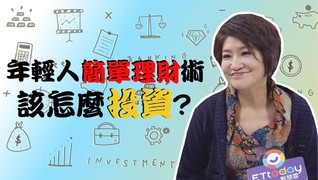
讀者迴響